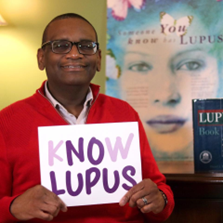Christopher Reed’s Story

J. Christopher Reed
Lupus Foundation of America-Georgia
Support Group Facilitator, Advocacy Chair
Christopher was diagnosed with lupus in 1990 at the age of 16. Lupus attacked his heart, lungs, kidneys, digestive system, veins, and nervous system. Christopher’s lupus journey began with chronic headaches and frequent muscle spasms then progressed to frequent fevers, arthritis, and tremendous weight loss. He was barely able wrap his hands around the steering wheels during driver’s ed class and walking up the stairwell to his bedroom felt like he was having a heart attack. In 2004, he developed stage 3 kidney disease. With his first job out of law school, Christopher was juggling kidney disease and horrible chemotherapy treatments. In 2018, he almost lost his life due to septic shock.
Overtime, Christopher continued to suffer from severe organ involvement. He was constantly worried about a lack of insurance and the cost of his life-saving medication.
Despite these serious lupus attacks, and moving back to his parent’s home, Christopher earned a bachelor’s degree with honors from the Georgia State University and a law degree from Tulane University. He attributes his success to God, the support of family and the support received at an early age from the Lupus Foundation of America, Georgia Chapter (LFAGA).
In speaking with Christopher, one can tell he is an avid advocate passionate about tackling healthcare policy and increasing lupus research. He previously chaired the Georgia Council on Lupus Education and Awareness (Council), a sponsored entity created by the state legislature to improve the lives of Georgians living with lupus. He has worked to establish the Georgia Lupus Collaborative, an advisory group and think tank charged with improving the lives of people with lupus in Georgia.
Christopher currently serves as a Support Group Facilitator, Advocacy Chair, and Project Manager for the Lupus Foundation of America-Georgia Chapter. His support group is specifically designed for men. As Advocacy Chair, he gives presentations on patient advocacy and public health policy as well as being a writer on Lupus. Each year, over a one hundred lupus advocates engage in Lupus Day at the Georgia State Capitol. He remains involved in Health Research and serves to increase African American participation in clinical trials through a series of education sessions, open discussion, and dialogues with African American physicians and African American researchers.
Christopher has been honored to be a recipient of several awards including the Mary Cann Achievement Award from the Lupus Foundation of America, Georgia Chapter.
The post Christopher Reed’s Story appeared first on Georgia Bio.





